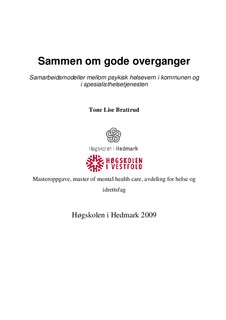Sammen om gode overganger : samarbeidsmodeller mellom psykisk helsevern i kommunen og i spesialisthelsetjenesten
Master thesis
Permanent lenke
http://hdl.handle.net/11250/132494Utgivelsesdato
2009Metadata
Vis full innførselSammendrag
Norsk: Studien ”Sammen om gode overganger”, fokuser på hvilke samarbeidsrutiner og relasjoner som må
etableres mellom kommunene og psykoseavdelingen på et psykiatrisk sykehus for å få til en god
rehabiliteringsprosess for pasienten. Studien er en del av et miljøterapiprosjektet, og er et
samarbeidsprosjekt med Høgskolen i Hedmark. Målgruppen for prosjektet er mennesker med
alvorlig psykisk lidelse og et samtidig rusproblem. Prosjektets målsetting er å bedre det
miljøterapeutiske behandlingstilbudet og bidra til kompetanseheving hos personalet. Studien har en
fenomenologisk, hermeneutisk tilnærming med deskriptiv design. Intervensjonen har bestått av
fokusgruppeintervjuer og rundbordskonferanser. For å ivareta samhandlingsperspektivet er det
nedsatt grupper med representanter fra sykehuset og samarbeidskommuner. Dataene er analysert
med kvalitativ innholdsanalyse.
Resultatene viser at for å lykkes i samarbeidet, må pasientens behov og medvirkning settes i sentrum
for utvikling av tjenestene. De ansatte må bidra til å skape et verdig liv ved å tilrettelegge sosiale
arenaer, materielle forhold og samarbeide med pasientens personlige nettverk. Det er dårlig utbygde
kommunale tjenenester til denne pasientgruppa og uklarheter i koordineringsansvaret. Vesentlig for
samhandlingen er relasjonsutvikling og dialog. Det er viktig å ha respekt og likverdig samhandling,
kjenne til hverandres roller og funksjoner, dele faglig kompetanse og avklare forventninger, foruten
å starte samarbeidet tidlig. Tidlig kartlegging og felles målsetting kan redusere innleggelsestiden i
sykehus. Samarbeidet underveis i behandlingsforløpet baseres på dialog, god
informasjonsutveksling, struktur, planlegging og ansvarlig rollefordeling. Koordineringsansvaret bør
avtales og det bør jobbes mer målrettet med bruk av individuell plan. Ved utskrivning fra sykehus
vektlegges gradvis tilbakeføring med planlegging av permisjoner, hospitering, fleksibilitet og
overlappende tjenester, kriseplaner, kompetanseoverføring og veiledning. Økonomiske, mobile
innsatsmidler, fra sykehus til kommunene bør benyttes i særskilte tilfeller. Samarbeidet har
utfordringer som bør løftes til ledelse og politisk nivå. English:
The project “Concerted actions for soft transitions” focuses on the shared routines and relationships
which need to be established between the local authority and the psychosis division of a psychiatric
hospital in order to ensure an ideal environment for rehabilitation. The project is part of an
environmental therapy project in the psychosis division in conjunction with Hedmark University
College. The target group of the project includes those with a serious psychotic disability
simultaneous to an intoxication problem. The aim of the project is to suggest improvements to
environmental therapy and to increasing staff skills. The study has a phenomological, hermeneutic
approach with a focus on descriptive design. This has involved focus group interviews and roundtable
conferences. In order to maintain an interactive perspective, groups were formed comprising
representatives from the hospital and the participating local authorities. The momentum for action
was maintained through weekly dialogues at the two units of the division. The data was processed
with the aid of a qualitative content analysis. The finds are presented in tables within a municipal
perspective, a special health services perspective and an interaction perspective.
The results indicate that in order for concerted actions to be successful, the patient’s needs and
participation must be placed at the centre of service development. The staff must contribute to
establishing a dignified life by organising social arenas, material circumstances, and through
involvement with the patient’s social network. Municipal services are poorly developed for this
patient group and responsibility for coordination is obscure. Essential for interaction and teamwork
is the development of relationships and dialogue. It is important to have respect and mutual
cooperation, to be aware of each other’s roles and functions, to share professional expertise and to
discuss expectations, in addition to the commencement of cooperation at an early stage. Registration
of the patient’s circumstances and joint objectives can serve to reduce the period of hospitalisation.
Cooperation during the course of treatment is based on dialogue, good information exchange,
structural planning and delegation of functions. The coordination of responsibility needs to be
determined and there is a need to focus more objectively by incorporating an individual program.
Upon discharge from the hospital, importance is attached to a gradual reintroduction into the
community in stages with planned leaves of absence, incorporating flexibility and overlapping
services, a crisis plan, transfer of skills and guidance. Economic mobile contributions should be used under special circumstances. Cooperation involves challenges which need to be elevated to the leadership and the political level.
